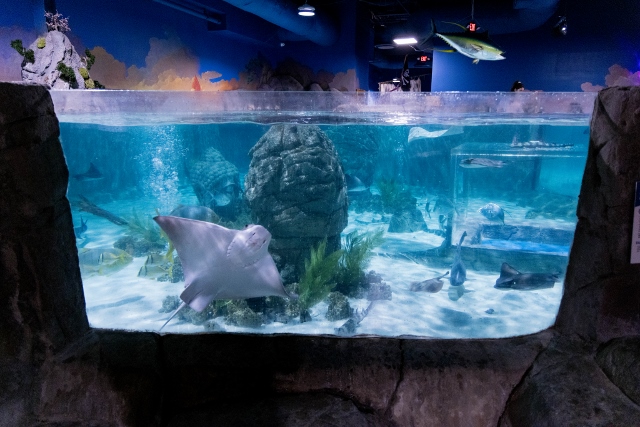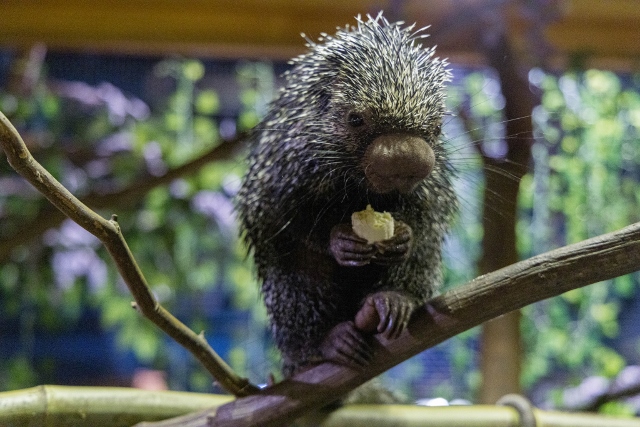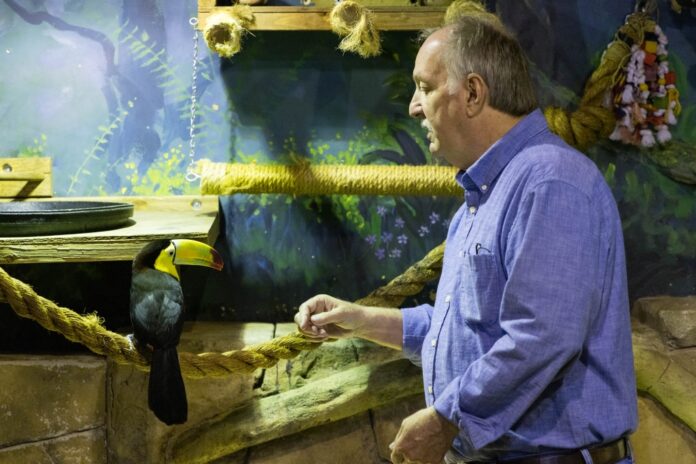On one morning each month, Stephen A. Smith examines the health of more species of animals than many veterinarians will in a lifetime. Because of that, some students get that same experience before they even graduate as veterinarians.
Sloths, capybaras, otters, porcupines, stingrays, sharks, multiple varieties of reptiles and fish, and more — all part of the Virginia-Maryland College of Veterinary Medicine professor’s rounds at SeaQuest Lynchburg, one of only eight such interactive aquariums and zoos SeaQuest operates nationally.

“He’s here monthly and I can call him at any point in time during the day if I have an issue with any animals,” said Alicia DeMay, who supervises the care of animals at SeaQuest. “He comes in and we go around, we talk about every single animal that’s here. We can go over issues, behavioral issues, medical issues, anything like that. It’s nice to have somebody that you can bounce things off of and have the right answer.”
Smith, professor in the Department of Biomedical Sciences at Pathology at VA Tech’s veterinary college specializing in wildlife and exotic animal medicine, aquatic medicine, and fish health, has cultivated a relationship with SeaQuest as its principal veterinarian.
“This is the pinnacle of my career here at the college,” Smith said, “doing something like this with exotic animals and learning both from the staff here and also learning from the animals themselves.
“We are the only SeaQuest aquarium that has a veterinarian associated with a veterinary college,” he said.
That in turn has opened up opportunities for veterinary students from Virginia Tech to serve and learn at SeaQuest, located in Lynchburg’s River Ridge Mall almost a two hours’ drive from the Blacksburg campus, either joining Smith in his monthly visits or as part of a three-week externship.
“It gives them a little bit of hands-on experience here,” said Smith. “But more importantly, it gives them experience on what it’s like to be involved with a zoo or an aquarium where you don’t actually have a client bringing an animal in, but you’re looking at the biosecurity, the nutrition, and the environment of the animal.”

One such student is Alex Reddy, in her fourth and final year of studies at the veterinary college. Reddy, from Halifax in Southside Virginia, said she developed a passion for SeaQuest while she was an undergraduate at Liberty University in Lynchburg. A biology professor assigned Reddy and her classmates to observe one animal at SeaQuest closely, its behavior and nutrition. She chose stingrays.
“I spent a lot of time at this tank during my junior and senior year of undergrad,” Reddy said as sharks, stingrays, and various fish swam behind her. “And I remember I would always walk through here and think, ‘I really hope I get into vet school. And if I do, how cool it would be to do a rotation here.’ At the time, I didn’t know about Dr. Stephen Smith. So once I got to Virginia Tech for vet school and learned about him and that he was the vet here, I knew I had to do an externship here, because my passion for conservation and zoo and aquatic medicine was really cultivated here.”
She returned to Lynchburg to serve a three-week externship at SeaQuest last summer, spending one week on the mammal team, one week on the avian and reptile team, and another week on the marine team.
“To have that privilege to come back here as a vet student and be with the animals again, it was really special,” Reddy said. “But what also makes SeaQuest really special to me is the people. When I came here, I had the mindset of, I want to learn from those who have been here day in day out with these animals, who know every little detail about their behavior. I came in with the mindset of I want to learn from you and you teach me, not I’m the vet student and I’m going to teach you.”
The veterinary students do indeed learn a lot from the experienced SeaQuest staff, but the students also can bring a fresh perspective in the care of the animals.

“There are students here all year round, so we are pretty familiar with them, and it’s fantastic to have them here,” said DeMay. “They’ve got lots of questions. They sometimes think of things that we don’t think of because we’re so familiar with the animals here.”
”Having the students has been a positive,” said Shannon Jeirles, general manager of SeaQuest Lynchburg. “We’ve learned from them, and when those students have done their rotations here, I think they’ve learned from us. It’s expanded our knowledge of the animals, their behaviors, things to look out for.
“These are students that are going out into the veterinary world, and we’ve had an impact on them. And likewise, they’ve had a very big impact on us.”
Smith’s expertise is also greatly valued by the SeaQuest staff.
“Dr. Smith has been able to connect us with not only other experts in the field, but share his knowledge with our team,” said Jeirles. ”We have team members who are going to continue in careers in this field at other aquariums or zoos, and they’re leaving here with a wealth of knowledge.”
Smith credits fellow veterinary college faculty members Mark Freeman, clinical associate professor of community practice, and Sherrie Clark, professor of theriogenology, with making exceptional efforts to support his work at SeaQuest. Freeman has proven skilled at surgeries involving animals from SeaQuest far outside the normal realm of what he would see brought into the Veterinary Teaching Hospital at Blacksburg, while Clark has visited SeaQuest on several occasions to trim the hooves of the resident mini-pigs and perform ultrasounds on pregnant stingrays.
“Usually when people bring in a dog or cat, we can talk to them about the environment that they have at home,” Smith said. “But here it’s a little different, because we’ve got a different environment for every individual animal we have here. Our aviaries are much different than our aquatic aquariums, which are much different than our habitat for the sloth, or the capybaras or the wallabies. They’re all so totally different. And it gives our students a little bit of experience with the exotic world of veterinary medicine, rather than the domestic animals.”
“We are working with these individual animals and their unique personalities and their health,“ Reddy said. “But we’re also discovering information about how they function in the wild and what we can do to better care for them not just here, but also in the wild.
“One of my favorite things about exotics is that the work that we’re doing, whether at a zoo or aquarium or here at SeaQuest, could also impact the animals’ population globally.”
– Andrew Mann

